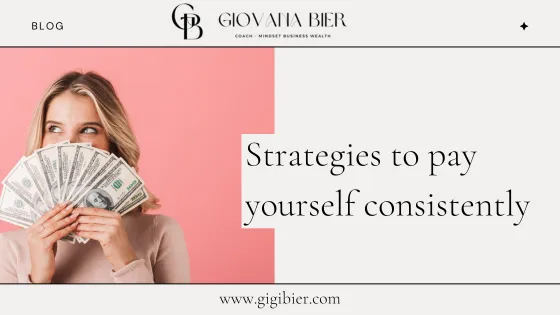
Paying Yourself Strategies for Small Business
You started your business for so many reasons: time freedom, impact, and to make money.
Yep, you can say that - there is no shame in wanting to make more money.
But now, a few months or years in, you're still struggling to make ends meet. One month you pay yourself a nice salary, the next month your account is in the negative.
This makes your nervous system go in a roller coster of emotions that are not supportive. You start to doubt yourself, you question if you are meant to be successful, if you are in the right track.
You might even find yourself in a cycle of chasing money - of doing projects and accepting clients that you know they are not a good fit, just because it's "good money".
Since 2019, I've supported dozens of entrepreneurs understanding the story their money tell and implement a simple money management system.
Money management and paying yourself
What does money management and paying yourself have in common? It all comes to understanding your money flow.
The first thing you need to have is an accounting system, a way of tracking your income and expenses. You can use a worksheet - like the Income and Expenses Tracker, a paper ledgers or even an automated accounting system [such as QuickBooks Online, Xero or Wave].
This is fundamental for you to start understanding the flow of your money, and to understand your profitability.
Once you have this in place, you can now start to manage your money. Managing your money simply means giving a "home" to your dollars.
I, personally, like using money management by percentage [a good read is Profit First by Mike Michalowicz]. I like this strategy because you can customize as it fits your business.
I'm not going to get too much in depth in money management [if you want more insight, I recommend you reading this post]
Anyways... Once you have your money management system, you can define the percentage of your income that will go towards paying yourself.
The main mistake I see from entrepreneurs - beginners or not - is not accounting for their own salary when managing their money. They end up either paying themselves left overs, or using their business as an ATM.
The Mindset Piece
There is a piece of this process that has to do with your mindset. With you believing that
1) you can understand the language of money
2) you are capable of managing your money
3) you are deserving of compensation
Allow yourself to try, to learn, and to make mistakes - this is the best way to start shifting your mindset.
It all starts with profit
Now, first things first, it all starts with profit. If your prices are not set up for profit, there is no money strategy that will work. This is because there is no money left to be managed.
Inside Pricing for Profit, you can learn how to price your products/services for profit, but in a nutshell, here is what you need to know to ensure profitability:
👉 the mechanics: your price must cover all the costs to deliver/provide for your services plus a profir margin
👉 the energetics: how does the price feels in your body? do you feel excited or resentful?
👉 the strategy: how does this offer/product fits in your offer stack?
I'd love to tell you that there is this one simple secret for prices, but it's a but nuanced and allow yourself to play with it!
Let's get to your "salary" strategy
When we are talking about paying ourselves through our business, there is not just one way to go about it.
If you are generating over $50,000 in profit, I recommend you chatting with a tax professional and consider the S-Corp election. This means you'll be paying yourself via payroll and it needs to be an amount that is considered "fair" for someone in your position. Like, what you would pay someone to do the same job.
If you're still not generating this level of profit, or if you're just starting your business, the first thing I want you to do is: commit yourself to paying yourself monthly - be it $1 or $10,000.
Secondly, it is to create a plan: Let's say, right now you're paying yourself "left overs" and very inconsistently, and you want to pay yourself 50% of your revenue, you're not going to start with this big of a leap.
Perhaps the plan will be as following:
Current: 1% of revenue is Owner's Compensation.
Goal: 50% of revenue to be Owner's Compensation
Month 1: 5%
Month 2: 7%
Month 3: 10%
Month 4: 10%
Month 5: 15%
Month 6: 15%
Month 7: 20%
Month 8: 25%
Month 9: 30%
Month 10: 35%
Month 11: 35%
Month 12: 40%
Month 13: 40%
Month 14: 50%
remember, this is just an example - you can define a plan that works for you, or work with a professional [like me 🤭] to help you create a personalized plan.
When thinking about defining the % for the salary, there are a few things to consider:
Tax Savings: how much are you saving for tax payments
General Operating Expenses: how much do you need to cover for your expenses
You always want to be mindful when defining how much you'll pay yourself.
If you want more support, you can download the "How to Pay Yourself" worksheet for free.
© GIGIBIER.COM | ALL RIGHTS RESERVED | TERMS & CONDITIONS | Privacy policy | SITE BY FUNNEL GORGEOUS

